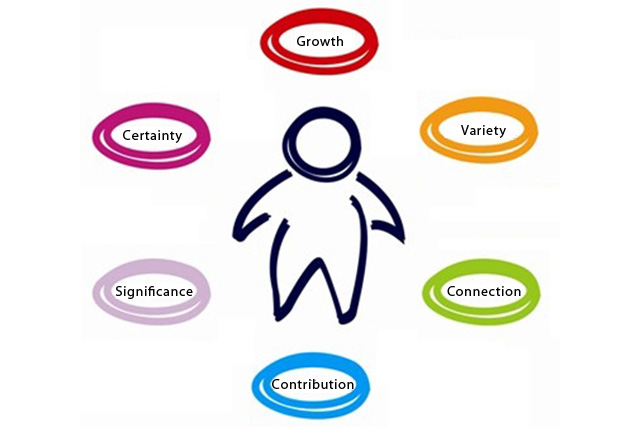The 6 human needs are one axis of examining human psychology and behaviors. It is the equivalent of Maslow’s hierarchy of needs, it’s just done through the scope of “neural patterns.” They are:
1. certainty
2. uncertainty
3. significance
4. love/ connection
5. growth
6. contribution
The first is the need for certainty, and because God has a great sense of humor, the second is the need for uncertainty. Now in your need for certainty, if you cannot get it, you will fight. If your needs for certainty are not met, you will fight for them and you will call that control. Your real needs for certainty are driven by the inverse to your willingness or need for uncertainty. The more uncertainty you can handle, the less certainty you need.
Another way of thinking about it is in understanding that you are certain you can handle the uncertainty. When people can’t handle uncertainty, they fight for control. That’s why this psychology is “half-empty” and less resourceful, because it’s driven by what they don’t want.
The need for uncertainty is inverse to certainty. However, the direct proportion to uncertainty relates to Greatness. The more you can tolerate and desire uncertainty, the greater you’re going to find your “mental software” can expand. In Greatness psychology, failure actually increases. Your tolerance for uncertainty must incorporate the fact that you don’t care about failure. Or, at least that you know how to take failure and wire it for pleasure, for greatness, and for growth. You have an equation that says failure is awesome! Control freaks would tell you failure is a disaster.
The third human need is significance and the fourth is love. Surprisingly enough, because these are in priority order, you would rather be significant than have love. And if you cannot find love, you will settle for connection. You’ll connect with somebody and call it love.
The first 4 needs are internal, the fifth and sixth are external: growth and contribution, because these take you out into the world.
Maslow’s hierarchy says that you cannot be self-actualized if there aren’t some fundamental needs met first. If you’re not safe, if you can’t put a roof over your head or the heads of your loved ones, you’re not going to self-actualize.
This becomes a great leadership tool. If you have a strategy geared towards the realization of the first three, that strategy will be addicting. It’s interesting when you start applying this tool to people’s behaviors. When you look at most people who say they are depressed, how certain is it? Extremely, because every day they know they’re going to be depressed.
For most people, uncertainty is not one of their main priorities. It might be a mediocre one, and they’ll go test themselves with uncertain things occasionally. They’ll go to a new restaurant and say, “I still find this depressing.” They’ll go and make a new relationship, “Look they can’t handle me.” They’ll do uncertain things in a skeptical pattern to prove that the depression is real to them.
And why do they get significance? Because, they’re depressed! They will say things like, Nobody is as depressed as me, and Look at how terrible everything is, and I’m on four different medications and I’ve been to the best shrinks in the world, and My parents did this to me, and This trauma happened to me. Their significance is huge.
How does their depression relate to connection? Would it be high or low? It’s high, they’re incredibly connected to their depression. “I can wallow in me. I can just sit on this couch and connect to myself all day long. This is horrible to be me.” And they will also get attention from other people who want to comfort and sympathize with them.
Now that we’ve already looked at the first four, we really don’t even need to go to growth and contribution because this “depression strategy” is going to be addicting.
If you choose to go after someone’s “mental software” based on these six human needs, you can turn their world entirely upside-down. You find a time when they weren’t depressed, you find a time when they had happiness and you build on that. And in order to get them to change, their needs must be met at the same as or higher level for the new strategy that you are creating for them. And the higher you can make the new strategy meet their needs and they see that and get that, it’ll be easy to lift them from one strategy and put them on another.
You can take the most depressed person in the world and in 30 to 45 minutes, even sometimes against their will, and you can put the change process in motion. When they go back into their lives the next day, and they’re not going to be able to look at things the same way they did before.
Key Points:
· The first four are internal; the last two are external
· The irony of uncertainty (diversity/ variety) and its role in Greatness.
· Crucial: most settle for connection absent finding love.
· Significance is an “away pattern” is a real half empty driver. (bad publicity > no publicity. patterns and programs.)
· Number 1 is a biggie. We all want certainty.
· The need for uncertainty is inverse to certainty. The direct proportion, however, to uncertainty relates to greatness. The greater you can tolerate and desire uncertainty, the greater you’re going to find your software can expand and be because at the end of the day if you can handle any uncertainty.


1 Comment
Leave your reply.